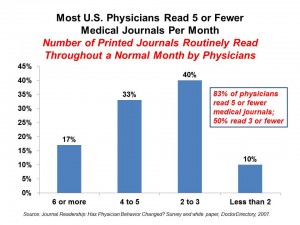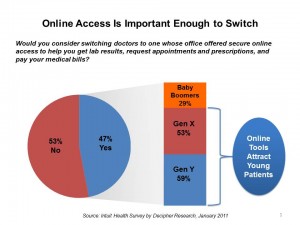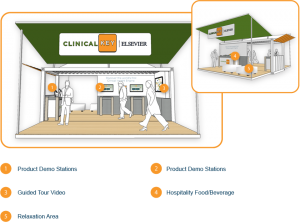There are many definitions of mobile health, and Elsevier is adding another to the list. The world’s largest medical publisher has taken its new clinical search tool, ClinicalKey, on the road.
Coined the ClinicalKey Experience Tour, Elsevier is coming to a medical center near you to enable clinicians, medical librarians, and health care administrators to give ClinicalKey a spin in their hospital’s parking lot.
 The challenge: the amount of new medical information doubles every 5 years, while 4 in 5 physicians say they have less than five hours a month to keep up with this, according to a DoctorDirectory survey. At the same time, health care providers feel hard-pressed to meet patient demands during visits, and patients demand as high a level of customer service from the health system as they receive in other aspects of daily living.
The challenge: the amount of new medical information doubles every 5 years, while 4 in 5 physicians say they have less than five hours a month to keep up with this, according to a DoctorDirectory survey. At the same time, health care providers feel hard-pressed to meet patient demands during visits, and patients demand as high a level of customer service from the health system as they receive in other aspects of daily living.
To help meet this challenge, physicians need ready access to get the right information into their hands at the right time. Of prime concern to the 2,000 doctors with whom Elsevier consulted was accessing evidence-based and peer-reviewed content (1) in a useful format, and (2) as quickly as possible.
That’s what ClinicalKey was conceived to do as a “clinical insight engine.” The tool’s content incorporates 500 medical journals, 800 medical textbooks across medical and surgical specialties, MEDLINE abstracts, Elsevier’s medical and surgical videos (9,000+), and other publications. In addition, ClinicalKey includes clinical images which researchers can pull into PowerPoint format with complete source information. All told, there are over 20 million pieces of content that are semantically tagged down to the sentence. This detailed level of tagging allows information seekers to quickly get a very clinically targeted search. Elsevier refreshes the data in ClinicalKey every day — helping clinicians stay current with the latest published research, just-in-time.
In what is the first promotional effort of its kind in health care, the ClinicalKey Tour literally hit the road for St. Louis’s Mercy Medical Center on September 17, 2012. Staff at the hospital visited the mobile, 470 square foot “suite” that unfolds from a transportable pod, fitted with Wi-Fi, phone charging stations, good lighting and comfortable places to sit. Inside, clinical information seekers found interactive demo stations, allowing them to try out the ClinicalKey tool in real time. The first graphic illustrates the layout of the unit.
The ClinicalKey Tour will hit medical centers around the U.S. starting in the Midwest (Missouri, Wisconsin, and Ohio), then on to the northeast (Connecticut, Massachusetts, Pennsylvania), the Mid-Atlantic (Maryland, Virginia), the south (South Carolina, North Carolina, Florida, Louisiana), and finally to Texas and beyond, with more stops to be scheduled. The Tour will conclude on December 12, 2012. Check out the Tour schedule on Elsevier’s ClinicalKey Tour schedule online.
 Health Populi’s Hot Points: Health consumers expect their doctors to operate their practices with 21st century technology: via online and mobile platforms. In the 2011 Intuit Annual Health Care Checkup Survey, one-half of patients said that online access with a physician’s office would be important enough to switch to another provider who does offer such access. The pie chart illustrates the finding.
Health Populi’s Hot Points: Health consumers expect their doctors to operate their practices with 21st century technology: via online and mobile platforms. In the 2011 Intuit Annual Health Care Checkup Survey, one-half of patients said that online access with a physician’s office would be important enough to switch to another provider who does offer such access. The pie chart illustrates the finding.
Consumers expect that their physicians will have access to the latest medical information in the just-in-time society they live in. ClinicalKey’s goal is to deliver on that promise. Over the next few months, the Experience Tour will receive real-time feedback from clinicians trying out the product with their own unique searches. Elsevier has already taken in early feedback to incorporate into the next version of the product, slated for 1Q13.
Stay tuned to future Health Populi posts on ClinicalKey in latter October, and in November and December. Elsevier has invited me to be a sort of virtual “embedded reporter” to experience the ClinicalKey Experience tour and discuss various aspects of the tool in the context of larger trends in health care impacting providers.





 I am so grateful to Tom Lawry for asking me to pen the foreword for his book, Health Care Nation,
I am so grateful to Tom Lawry for asking me to pen the foreword for his book, Health Care Nation,  I love sharing perspectives on what's shaping the future of health care, and appreciate the opportunity to be collaborating once again with Duke Corporate Education and a global client on 6th May. We'll be addressing some key pillars to consider in scenario planning such as growing consumerism in health care, technology (from AI to telehealth), climate change, and trust -- the key enabler for health engagement or dis-engagement and mis-information. I'm grateful to be affiliated with the corporate education provider
I love sharing perspectives on what's shaping the future of health care, and appreciate the opportunity to be collaborating once again with Duke Corporate Education and a global client on 6th May. We'll be addressing some key pillars to consider in scenario planning such as growing consumerism in health care, technology (from AI to telehealth), climate change, and trust -- the key enabler for health engagement or dis-engagement and mis-information. I'm grateful to be affiliated with the corporate education provider  Thank you FeedSpot for
Thank you FeedSpot for